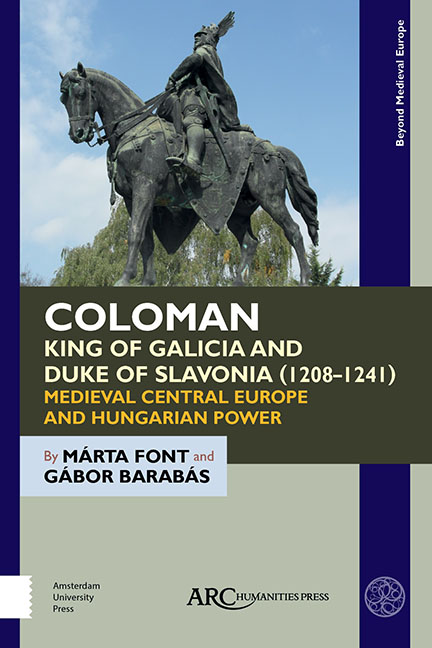 Coloman, King of Galicia and Duke of Slavonia (1208–1241)
Coloman, King of Galicia and Duke of Slavonia (1208–1241) Book contents
- Frontmatter
- Contents
- List of Illustrations
- Foreword
- Introduction
- PART ONE COLOMAN AS CHILD RULER OF GALICIA
- Chapter 1 The Galician Context in 1205
- Chapter 2 The Agreement of Scepus
- Chapter 3 Coloman’s Coronation as King of Galicia: Date and Place
- Chapter 4 The Hungarian Elite and Coloman’s Court
- Chapter 5 Coloman’s Position in Halych, 1215–22: Campaigns and Opponents
- Chapter 6 Upholding the Galician Claim: Coloman’s Place in Hungary
- PART TWO COLOMAN, DUKE OF WHOLE SLAVONIA (1226–1241)
- Chapter 7 Coloman and Scepus, Before 1226
- Chapter 8 Coloman as Duke of Whole Slavonia from 1226
- Chapter 9 Coloman’s Status and the Inner Workings of the Duchy
- Chapter 10 Coloman’s Ecclesiastical and Secular Actitivities in Slavonia
- Chapter 11 Coloman’s Rule in Slavonia
- Chapter 12 Politics and Dynastic Affairs
- Chapter 13 Challenges in the Balkans
- Chapter 14 The Mongol Attack and Coloman’s Death
- Conclusion: Coloman in the Eyes of Posterity
- Bibliography
- Index
Introduction
Published online by Cambridge University Press: 20 November 2020
- Frontmatter
- Contents
- List of Illustrations
- Foreword
- Introduction
- PART ONE COLOMAN AS CHILD RULER OF GALICIA
- Chapter 1 The Galician Context in 1205
- Chapter 2 The Agreement of Scepus
- Chapter 3 Coloman’s Coronation as King of Galicia: Date and Place
- Chapter 4 The Hungarian Elite and Coloman’s Court
- Chapter 5 Coloman’s Position in Halych, 1215–22: Campaigns and Opponents
- Chapter 6 Upholding the Galician Claim: Coloman’s Place in Hungary
- PART TWO COLOMAN, DUKE OF WHOLE SLAVONIA (1226–1241)
- Chapter 7 Coloman and Scepus, Before 1226
- Chapter 8 Coloman as Duke of Whole Slavonia from 1226
- Chapter 9 Coloman’s Status and the Inner Workings of the Duchy
- Chapter 10 Coloman’s Ecclesiastical and Secular Actitivities in Slavonia
- Chapter 11 Coloman’s Rule in Slavonia
- Chapter 12 Politics and Dynastic Affairs
- Chapter 13 Challenges in the Balkans
- Chapter 14 The Mongol Attack and Coloman’s Death
- Conclusion: Coloman in the Eyes of Posterity
- Bibliography
- Index
Summary
PRINCE COLOMAN, SECOND son of King Andrew II (1205–35) and younger brother of King Béla IV (1235–70), is perhaps not the best-known member of the Árpádian dynasty (1000–1301), nor of medieval Hungarian rulers, yet his life was quite extraordinary. He was the second member in his dynasty with this name, the first being King Coloman the Learned (1095–1116). The man who would later become King of Galicia and Duke of Slavonia was born in 1208, the fourth child of Andrew II and Queen Gertrud of Andechs, making him a prince of the ruling Árpád dynasty.
Coloman was barely six years old when he was engaged for marriage to Salomea, the daughter of Leszek the White (Biały), Duke of Kraków, as a result of an agreement in 1214 between their fathers over the Scepus region (Szepes, Spiš). Not long afterwards (it is disputed exactly when, as we shall see later) he was crowned king of a principality of the Kievan Rus’, Galicia (Halych), receiving the royal title with crucial papal approval and crown coming from Pope Innocent III (1198–1216).
A few years later, probably in 1221, Coloman and his wife were forced to leave Galicia, in today's western Ukraine, and moved to Hungary, and settled down in the Scepus. Another few years passed by and he became the duke (dux) of the southern part of the medieval Hungarian Kingdom, Slavonia, in 1226, and retained his royal title, derived from his coronation in the Rus’ian principality of Galicia. As the ruling leader of a part of the Kingdom of Hungary, he was authorized to govern Slavonia, Croatia, Dalmatia, and the attached Hungarian counties (comitatus). Nevertheless, he was also active in other Hungarian affairs that have not been considered strictly as his remit; for instance, he mediated between his father and older brother, Béla, or supported the new king even after his enthronement.
Coloman probably led a successful military campaign to Bosnia around 1236 against the local Bogomil heresy, the so-called Bosnian Church, and also took part in the battle of Muhi against the Mongol invaders in 1241. He was able to escape from the battlefield but was seriously wounded and died from his injuries a few weeks later near Zagreb, in Čazma (Csázma).
- Type
- Chapter
- Information
- Coloman, King of Galicia and Duke of Slavonia (1208–1241)Medieval Central Europe and Hungarian Power, pp. 1 - 8Publisher: Amsterdam University PressPrint publication year: 2019


